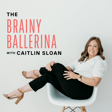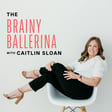
11. Finding Your Voice in the Dance Industry with Ashley Tomaszewski
Ashley Tomaszewski is the Founder and Director of THREE POINT PROJECT, a professional project company based in Wisconsin. She is a graduate of Butler University with a Bachelor of Arts in Dance Pedagogy and an esteemed choreographer with works being performed by ButlerBallet throughout Europe, at MashUp’s International Women’s Day Festival and by SALT2. In addition to directing, choreographing, and teaching, Ashley is in her second season as an artist with Geometry Dance Company in Los Angeles, CA.
In this episode we discuss Ashley’s U-turn from ballet to contemporary, the journey of starting her own professional dance company, and her work as a choreographer. She shares openly about how she’s developed self-trust as a dancer, knowing your worth, and how to make truly meaningful connections.
Key Moments:
- Early dance training [1:45]
- Choosing to attend Butler and pursue a dance degree [3:28]
- Taking a U-turn from ballet to contemporary [4:12]
- Dancing in her first professional company [7:00]
- Starting her own professional dance company [8:31]
- The future of THREE POINT PROJECT [13:10]
- What she looks for in dancers for her company [16:01]
- Her journey as a choreographer [21:40]
- Developing self-trust in your dance career [27:50]
- Knowing your worth as a dancer [33:43]
- Her biggest piece of advice for dancers pursuing a career [38:38]
Connect with Ashley:
THREE POINT PROJECT: www.threepointprojectwi.com
INSTAGRAM: instagram.com/threepointprojectwi
INSTAGRAM: instagram.com/ashley.tomaszewski
Links and Resources:
The College Dance Decision: thebrainyballerina.com/the-college-dance-decision
1-1 Career Mentoring: book your complimentary career call
Let’s connect!
My WEBSITE: thebrainyballerina.com
INSTAGRAM: instagram.com/thebrainyballerina
Questions/comments? Email me at [email protected]

